康德社会哲学翻译
[《康德三大批判精粹》的翻译理念] 康德哲学的主要观点
![[《康德三大批判精粹》的翻译理念] 康德哲学的主要观点](https://img.taocdn.com/s3/m/e9d5ca2ac8d376eeafaa31b2.png)
《[《康德三大批判精粹》的翻译理念] 康德哲学的主要观点》杨祖陶和邓晓芒两位先生编译的《康德三大批判精粹》由人民出版社出版了。
恰逢其时,我对康德哲学兴味正浓。
在把杨、邓两位先生所编译的《精粹》后半部即《实践理性批判》和《判断力批判》的精粹读完后,颇有所思,乃是关于翻译的,兹记于后。
按此书后记,精粹全部译文均由邓晓芒先生据德文本译出,又由杨祖陶先生逐一校订之。
我以为,精粹本所体现出的翻译理念,对于我们应当如何恰当地引译西方哲学原典这一问题,给出了一个颇具特色而又富启发性的回答。
可概括为两点。
特色之一,译者试图实现译文�汉语�与原文�德文�在句法结构上的对应。
译文应当忠实地表达原文的义理,这乃是译界的公论,舍此恐怕也谈不上什么翻译了。
所谓“信”、“达”也。
译界的另一似乎已成为“公论”的要求,便是“雅”。
就是说,在翻译中,考虑到译文�汉语�与原文�如德文�之间的语法不同,翻译应当灵活而忌死板。
西方哲学文献中往往会出现一些构造很复杂却又不失逻辑的简明与严格的、有时候长达一整段话的长句,而汉语又被认为是“不适合于”构造长句的,所以,在把长句式的西文译成汉语时,尤其需要通过一些翻译技巧,将其拆成几个句子,以使其合乎汉语的“习惯”。
这一观念在精粹本中可说是受到挑战。
比照一下同样是据德文原本所译出的《判断力批判》的宗白华译本和精粹本,不同之处是显著的:同样一段话,宗译本有时需两三句才译出,而精粹本却能做到只用一句译出。
这说明了什么?这并非一个翻译的可能性问题,因为精粹本已经做出了回答:汉语同样可以做到与西文对应的既不失逻辑的清晰又体现句式的庞杂繁冗的表达。
这也不是一个在语言上的翻译能力高低的问题:老一辈学者们治学的严谨和西语功底的深厚,是人们有目共睹的。
两种译本间的差别,乃是各自所持翻译理念不同的表现,而两者翻译理念的不同,在我看来,其实是对于思想内容与语言形式之关系的不同理解造成的。
我们可以问,那使人们感到艰涩沉重�甚至矫揉造作�的,也因而译家们想要“雅”起来的东西是什么?仅仅只是西语的长句式吗?的确,西语是能构造长句式的,但问题在于:它也不只是长句式的。
哲学专业的英文名词

哲学专业的英文名词
1. Metaphysics(形上学):研究存在、实体和本质的学科,探讨现实的本质和不可见的现象。
2. Epistemology(认识论):研究知识的起源、性质、限度和验证方法的学问。
3. Ethics(伦理学):研究道德原则和价值观的学科,探讨如何判断行为的对错以及如何做出道德决策。
4. Logic(逻辑学):研究与推理和论证相关的规则和原则的学科,帮助我们理性思考和辨别谬误。
5. Aesthetics(美学):研究艺术、美和审美经验的学问,探讨美的本质和艺术的功能。
6. Philosophy of Mind(心灵哲学):研究意识、心灵和思维的学科,涉及到意识的起源、本质和关系。
7. Philosophy of Science(科学哲学):研究科学方法和科学知识的起源和本质的学科。
8. Political Philosophy(政治哲学):研究政治权力、公正和社会秩序的学问。
这些是哲学专业中的一些常见英文名词,涵盖了不同领域的研究。
对于想要深入了解哲学的人来说,理解这些名词是很重要的。
在学术研究和讨论中,使用正确的英文术语可以提高交流的准确性和清晰度。
注意:以上内容仅供参考,具体术语使用请根据具体情况和相关权威资源进行确认。
哲学翻译词汇
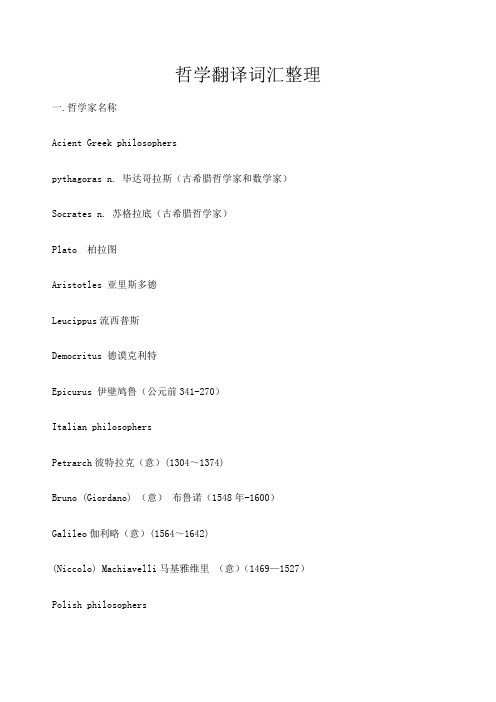
哲学翻译词汇整理一.哲学家名称Acient Greek philosopherspythagoras n. 毕达哥拉斯(古希腊哲学家和数学家)Socrates n. 苏格拉底(古希腊哲学家)Plato 柏拉图Aristotles 亚里斯多德Leucippus流西普斯Democritus 德谟克利特Epicurus 伊壁鸠鲁(公元前341-270)Italian philosophersPetrarch彼特拉克(意)(1304~1374)Bruno (Giordano) (意)布鲁诺(1548年-1600)Galileo伽利略(意)(1564~1642)(Niccolo) Machiavelli马基雅维里(意)(1469—1527)Polish philosophersCopernicus哥白尼(波兰)(1473~1543)German philosophersKant: 康德(德)Nietzsche n. 尼采(德,1844-1900) (Ludwig) Feuerbach 费尔巴哈(Arthur) Schopenhauer 叔本华Hegel: 黑格尔, Hegelian,黑格尔的The Young Hegelians 青年黑格尔学派Marx 马克思Engels 恩格斯English and Scottish philosophers Francis Bacon 培根(英)(1561—1626)John Locke 洛克(英)Thomas Hobbes托马斯.霍布斯(英)Adam Smith 亚当.斯密斯(苏格兰)David Hume 休谟(苏格兰)Thomas Malthus托马斯.马尔萨斯Isaac Newton艾萨克.牛顿(Bertrand) Russell 罗素Ricardo 李嘉图French Philosophers(Rene) Descartes笛卡尔(法)Cartesian adj.笛卡尔的(Baruch) Spinoza 斯宾诺莎(法)(Denis) Diderot 狄德罗(法)(Charles) Montesquieu 孟德斯鸠(法)(1689年至1755年),(Francois) Voltaire 弗朗索瓦伏尔泰(法)(1694-1778),(Jean-Jacques) Rousseau 卢梭(法)(1712-1778)Claude-Henri Saint-Simon 克劳德.圣西门(1760年至1825年)Francois Charles Fourier弗朗索瓦.查尔斯.傅立叶(1772年至1837年)Jean-Paul Sartre 萨特Danish philosopherskierkegaard:n. 齐克果American philosophersJohn Dewey 杜威(美). Skinner 斯金纳(美)Talcott Parsons 帕森斯Chinese philosophersConfucius:孔子Lao Tzu: 老子Chuang Tzu 庄子二. 哲学流派philosophical sects 哲学学派Greek Philosophy 希腊哲学Arabian Philosophy 阿拉伯哲学German classical idealist philogophy:德国古典唯心主义哲学Classical German Philosophy德国古典哲学French Socialism法国的社会主义British Political Economy英国的政治经济学Marxist philosophy 马克思主义哲学empirical philosophy 经验哲学materialism: 唯物主义。
社会伦理学中的康德主义观点

社会伦理学中的康德主义观点康德主义观点是社会伦理学中重要的一部分,主要强调道德行为应该基于理性和普遍性的原则。
这种观点由德国哲学家康德提出,对今天的道德和社会议题仍然具有指导意义。
康德主义观点认为人的行为应该遵循伦理规范,不仅仅是出于自身的利益考量,而是建立在道德的基础上。
康德主义强调人的自由意志和理性使得每个人都有责任去追求“善”的行为。
康德认为,我们通过理智的思考,可以发现一个普遍适用的“道德律”,这个律法被称为“卡凡德律”。
按照卡凡德律,一个行为只有在它的普遍适用性下才能被视为道德行为。
也就是说,一个人的行为只有在不适摄他人自由和权利的情况下才能被视为道德行为。
这就是康德主义强调的普遍性原则。
这个原则是基于康德对人的尊严的重视,他认为每个人都应该被看作是独立和自由的个体,有着独立的思考和决策能力。
基于这个原则,康德主义对一些社会伦理问题提出了独特的观点。
例如,康德主义强调人的行为应该遵循普遍的道德准则,因此反对利用他人的痛苦和苦难来谋取自己的利益的行为。
这就解释了为什么康德主义反对虐待动物、贫富差距过大等社会不公平现象。
康德主义认为,每个人都应该被平等对待,只有这样才能实现正义和道义。
此外,康德主义还强调了个体的责任和义务。
根据康德主义观点,每个人都有责任和义务去追求道德的行为。
这就要求人们在决策和行为中要考虑到他人的利益和福祉。
这也是康德主义对于慈善事业和社会公益的重视。
康德主义认为,个体的行为应该以维护社会整体的福利为目标,而不仅仅是满足自己的私利。
这种道德观念在今天的社会中仍然具有重要的意义。
然而,康德主义观点也存在一些争议。
有人认为,康德主义的普遍性原则并不适用于所有情况。
例如,在一些紧急情况下,个体可能需要违背普遍准则来拯救他人的生命。
康德主义在这方面的局限性就显现出来了。
另外,康德主义观点在实践中也不容易落实,因为个体的利益和欲望经常与道德行为发生冲突,这就需要个体在日常生活中进行道德选择。
哲学导论——何谓“道德”——如何过上“好”的生活 (1)
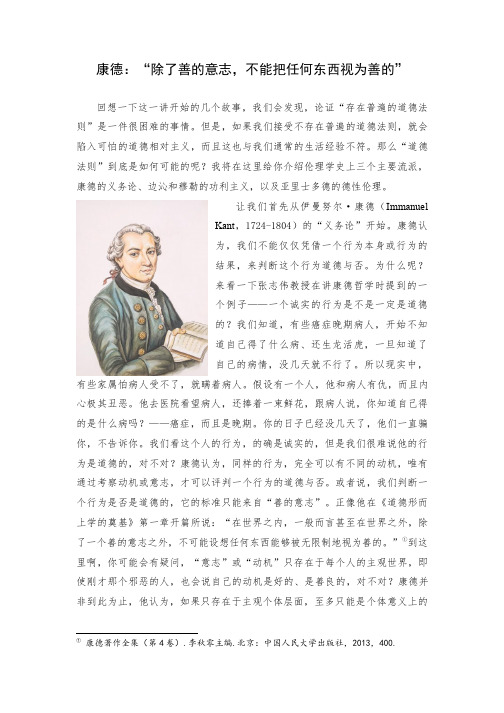
康德:“除了善的意志,不能把任何东西视为善的”回想一下这一讲开始的几个故事,我们会发现,论证“存在普遍的道德法则”是一件很困难的事情。
但是,如果我们接受不存在普遍的道德法则,就会陷入可怕的道德相对主义,而且这也与我们通常的生活经验不符。
那么“道德法则”到底是如何可能的呢?我将在这里给你介绍伦理学史上三个主要流派,康德的义务论、边沁和穆勒的功利主义,以及亚里士多德的德性伦理。
让我们首先从伊曼努尔·康德(ImmanuelKant,1724-1804)的“义务论”开始。
康德认为,我们不能仅仅凭借一个行为本身或行为的结果,来判断这个行为道德与否。
为什么呢?来看一下张志伟教授在讲康德哲学时提到的一个例子——一个诚实的行为是不是一定是道德的?我们知道,有些癌症晚期病人,开始不知道自己得了什么病、还生龙活虎,一旦知道了自己的病情,没几天就不行了。
所以现实中,有些家属怕病人受不了,就瞒着病人。
假设有一个人,他和病人有仇,而且内心极其丑恶。
他去医院看望病人,还捧着一束鲜花,跟病人说,你知道自己得的是什么病吗?——癌症,而且是晚期。
你的日子已经没几天了,他们一直骗你,不告诉你。
我们看这个人的行为,的确是诚实的,但是我们很难说他的行为是道德的,对不对?康德认为,同样的行为,完全可以有不同的动机,唯有通过考察动机或意志,才可以评判一个行为的道德与否。
或者说,我们判断一个行为是否是道德的,它的标准只能来自“善的意志”。
正像他在《道德形而上学的奠基》第一章开篇所说:“在世界之内,一般而言甚至在世界之外,除了一个善的意志之外,不可能设想任何东西能够被无限制地视为善的。
”①到这里啊,你可能会有疑问,“意志”或“动机”只存在于每个人的主观世界,即使刚才那个邪恶的人,也会说自己的动机是好的、是善良的,对不对?康德并非到此为止,他认为,如果只存在于主观个体层面,至多只能是个体意义上的①康德著作全集(第4卷).李秋零主编.北京:中国人民大学出版社,2013,400.“道德准则”,还不能成为评价一个行为道德与否的“普遍法则”。
康德的教育哲学

康德的研究:
以1770年为标志,康德的一生可分为前期和 后期两个阶段。在前期他主要研究自然科学, 重点是数学、天文学和化学,主要成就有正 负数理论和星云学说,在其他学科方面也深 有造诣;后期他则主要研究哲学,还涉及宗 教、逻辑学和人类学等领域。
.
康德的著作:
在其三十多年的研究生涯中,留下了三部划时代的 杰作:
.
自由意志与善的意志的关系
自由必然意味着善么?自由就是有可能为善也可能为恶。
亚当和夏娃如果不摘苹果,就不会犯罪,但也没有自由意 志,他们是上帝决定的动物。追求自由的目的不在于善, 而是要把人从动物提升上来。赋予人以高贵性,把人当作 有尊严的生物。
有尊严,可善可恶。恶棍也可能是高贵的,因为他是有自 由意志的,自由意志坚持一贯,敢作敢当,他也可以保持 人格上的高贵,当然我们在道德上要谴责他。我们追求的 是这样的自由,并不是说有了自由一切都好了。恰好相反, 有了自由一个人通常首先做坏事。但只要有自由,他在做 坏事中就可能会慢慢做起好事来。他会发现真正要自由得 到满足的还是做好事。做坏事是一时的,接下来就是不自 由了。
1755年康德重返哥尼斯堡大学,任讲师。1770年康德 被评为教授,1786年升任校长。在校期间他先后当选 为柏林科学院、彼得堡科学院和科恩科学院的院士。
1797年康德辞去大学的教学工作。1804年2月12日康 德逝世。
.
康德的生活:
一位传记家赞叹道:“康德的一生就像是 一个最规则的动词。”
道德律何以可能?
.
康德的答案
自由意志
每一个人应该为自己所做的行为负责。 为什么自由是最终的根据?自由是不可认识的,
可认识的就不是自由。所谓自由就是不可决定。 如果能够为自由找到根据、原因,它就不是自 由了,它就被纳入机械因果性的链条中了。
康德哲学的现代意义

摘要很多古代哲学思想都是有很强的生命力的,所以现代社会要以史为鉴,用古代哲学思考现代社会,吸取以前哲学派别的经验教训,现代哲学就不会犯同样的错误,可以解决许多棘手的问题。
最重要的是了解、研究了古代哲学,就能明白现代哲学从哪儿来的,怎么来的,预测哲学怎么发展、朝哪个方向发展,这对于开阔人们的视野,思维方式及看问题的视角都有重要的意义。
而康德在后世的影响非常广泛。
整个西方哲学界,不管是大陆哲学还是英美哲学,都受它的影响:有的是因为反对他而受到了它的影响,有的是因为发挥他而受到了它的影响,这都是由它所带来的一种风气。
所以有人说,康德就是一个蓄水池,所以以往的哲学都流向他这里,所有后来的哲学都从他这里流出来。
指导今天,全世界人们都公认,康德在哲学史上的地位是非常崇高的前言“有两件事情我愈加反省便愈以新而不断增加的赞叹和敬畏充满我的心灵,这两件事情便是:在我们上面的充满星辉的天空以及在我心中的道德法则。
”这是1880年在重修康德墓时,将这段《实践理性批判》的结束语刻在墓碑上。
在哲学史上,康德以他的三大批判-----《纯粹理性批判》、《实践理性批判》、《判断力批判》----闻名于世界,是近三百年来世界上最具有影响力的哲学家。
其实,作品是作家人格和精神的体现,也是构成人生的重要部分。
尤其对康德这位留下这么多不朽作品的哲学家而言,想深入认识他的精神世界、他的哲学对社会的现代意义,就得深入了解他的主要著作。
康德是18世纪末德国古典哲学家,他所建立的哲学体系,是西方哲学史上一座伟大的“丰碑”。
康德哲学对现代社会发展的影响十分深远,而且至今不朽。
整个西方哲学界,不管是大陆哲学还是英美哲学,都受康德哲学的影响:有的是因为反对他而受到了它的影响,有的是因为发挥他而受到了它的影响,这都是由它所带来的一种风气。
所以有人说,康德就是一个蓄水池,所以以往的哲学都流向他这里,所有后来的哲学都从他这里流出来。
指导今天,全世界人们都公认,康德在哲学史上的地位是非常崇高的。
从《康德译名的商榷》一文解读贺麟的早期哲学术语翻译思想

[ 关键词] 先天 ; 哲学术语翻译 ; 贺麟研究
[ 中图 分 类号 ] H 5 09 [ 献标识码] A 文
.
[ 章 编 号 ] 10 文 0 9一l2 (00 0 — 0 2— 4 12 2 1 ) 1 0 3 0
哲 学 家贺 麟 学 贯 中 西 , 融合 古 今 , 生 著 译 颇 丰 , 生 一 他 前 译 介 了 大量 的西 方哲 学 名 著 , 国 内影 响非 常大 。据 笔 在 者 不 完全 统 计 , 贺 麟 生前 发 表 的谈 论 翻译 的文 章 就 至 少 仅 宵5篇 , 最早发表的一篇是他 12 95年上清华学堂时于《 东 方杂志》 刊登的《 复的翻译》, 晚的一篇是 在《 上 严 最 中国 社会 科 学 院研 究 生 院 学 报 》 9 0年 第 3期 上 的 “ 谈 翻 19 谈
第1 第1 4卷 期
21 00年 3月
岱 宗 学 刊
J OUR L O AI O NA F D Z NG
Vo . 4 N0. 1 1 I Ma . 2 0 t 01
从《 德译 名 的商榷 》 康 一文解 读 贺麟 的
早 期 哲 学 术 语 翻 译 思 想
文 炳
译” 一文。贺麟不仅具有 丰富的翻译实践经 验 , 而且站在 哲学 的高度 , 从翻译 的哲学基础出发 , 对翻译 的认 识就必 然深刻 、 独到。本文 旨在从其早期发表的一篇文章来解读 其哲学术语的翻译思想 , 希冀能对学界中人在译介西方思 想 时 提供 一 些 借 鉴 。 笔者之所 以选 择《 康德译 名 的商榷》 这篇文 章 , 因 原 在于 : 由于历 史 的 原 因 , 西 学 东 渐 的 早 期 阶段 , l 在 即 9世 纪末 、 2 纪初到“ 四” 0世 五 前后 这 个 阶段 , 内学 人 对 西 学 国 的接受过程受 到 日本学界的影响很大 , 基本上属于被 动接 受期 , 时对 于 西 学 中 的大 量术 语 , 多袭 用 日文 的译 名 , 当 大 对此部分有识之士可谓是 痛心疾首 , 正如余又荪所言 : 我 “ 国学 术界 所 用 的 学 术 名 辞 , 都 是 抄 袭 日本 人 创 用 的 译 大 名 。这是一件极可 耻的事 ” …” 又如 张东荪指 出 : 以 。 “ 上 所 言 旧译 大 抵 皆 为 日译 。 国 人 于 翻 译 一 道 远 不 如 清 末 时代 , 尚有人 自创 名 词 。近 则 止 知 拾人 吐馀 而 已 。文 化 失 其创造性 , 可哀也 已” 。 伴 随着西学在 中国的进 一步 传播 , 大致到 2 O世纪 3 0年代时 , 来越多 的学人意识普 越 遍袭用 日文的译名所潜藏的弊端 , 并逐步地开始谋求 中国 在 学 术 上 的 自立 。学 术 上 自立 的首 要 任 务 就 是 纠 正 当 时 普 遍 袭 用 日文 译 名 的 做法 , 时也 是 自己动 手对 既 往 译 名 同 进 行 重 译 的过 程 。据 笔 者 有 限 的所 知 , 3 在 0年 代 期 间 仅 对 康 德 哲学 ( 日文 ) 名 的讨 论 , 有 熊 伟 于 13 译 就 9 3年 7月 2 日在 《 津 大公 报 》 表 的《 验 与 超验 》 0 天 发 先 一文 ; 贺麟 于
康德的历史哲学

LOGO可以这样理解,这样一个社会的建立,是 因为人的独立的倾向性,使得他们在野蛮 的自由状态下无法长久共处,不得不限制 各自的一部分自由,求得一种妥协。在这 种状态中,人类的自然秉赋才能够充分发 展。康德比喻说:犹如森林里的树木,正 是由于每一株都力求攫取别的树木的空气 和阳光,于是就迫使得彼此双方都要超越 对方去寻求并获得挺直美丽的姿态那样; 反之,那些在自由的状态之中彼此隔离而 任意在滋蔓着自己的枝叶的树木,便会生 长得残缺、佝偻而又弯曲。康德得出结论 说,一切为人道增光的文化和艺术,最美 好的社会秩序,就都是这种非社会性的结 果。
LOGO 我们说康德的前提本身是可疑的,但 并不影响他论证过程和结论的合理性。历 史同大自然一样,并没有任何目的性可言 。我们的世界看似一个精心安排的世界, 实际是由无数偶然的因素演化来的。有序 性来源于自组织现象和协同规律,社会与 自然事物一样,高度依赖于初始条件,并 可能因每一个微小的扰动改变运动轨迹。 历史和社会在大尺度看好像合乎某种自然 规律,在微观角度看,它的表现很可能是 混沌。在自然界中,有过寒武纪生命大爆 发,产生了无数种千奇百怪的物种,但是 很快就消失了。某些物种是通过大量的繁 殖,才得以保全的。
LOGO
命题三、大自然使人类完完全全由其自己 本身就创造出来超乎其动物生存的机械安 排之上的一切东西,而且除了自己本身不 假手于本能并仅凭自己的理性所获得的幸 福或美满而外,就不再分享任何其他的幸 福或美满。
大自然绝不作劳而无功的事,并且绝 不会浪费自己的手段以达到自己的目的。
LOGO
事实上,很难在本能和理性之间划出截然地分 界线来,理性本身就是人类本能的产物。幸福感 恰恰是以那种动物性的需求首先得到满足为基础 的。食不果腹衣不蔽体的人,很难有多少幸福感 。大自然不会作劳而无功的事,生物因某种需要 进化出的某些器官必然是为了某种功能而有的。 但是不止于此,这个器官除了这种特殊需要而外 ,往往还有一些剩余的功能,这些功能可能暂时 无用,甚至是自身的某种妨碍,但也许有一天这 种剩余功能就会变成必要的了。没有这种功能的 生物在生存中就会处于劣势。
康德的法权哲学
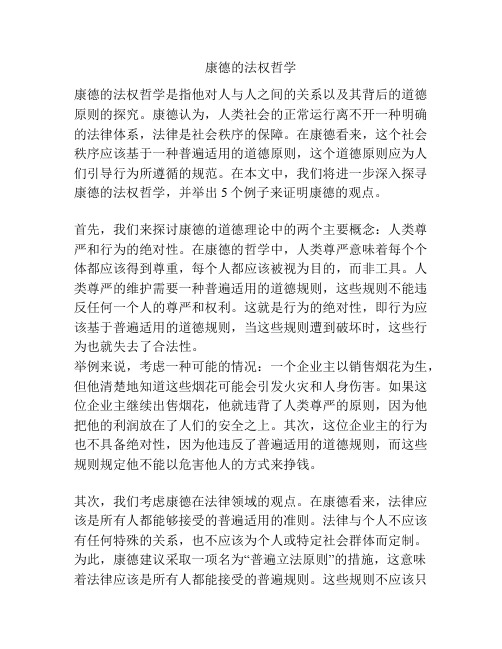
康德的法权哲学康德的法权哲学是指他对人与人之间的关系以及其背后的道德原则的探究。
康德认为,人类社会的正常运行离不开一种明确的法律体系,法律是社会秩序的保障。
在康德看来,这个社会秩序应该基于一种普遍适用的道德原则,这个道德原则应为人们引导行为所遵循的规范。
在本文中,我们将进一步深入探寻康德的法权哲学,并举出5个例子来证明康德的观点。
首先,我们来探讨康德的道德理论中的两个主要概念:人类尊严和行为的绝对性。
在康德的哲学中,人类尊严意味着每个个体都应该得到尊重,每个人都应该被视为目的,而非工具。
人类尊严的维护需要一种普遍适用的道德规则,这些规则不能违反任何一个人的尊严和权利。
这就是行为的绝对性,即行为应该基于普遍适用的道德规则,当这些规则遭到破坏时,这些行为也就失去了合法性。
举例来说,考虑一种可能的情况:一个企业主以销售烟花为生,但他清楚地知道这些烟花可能会引发火灾和人身伤害。
如果这位企业主继续出售烟花,他就违背了人类尊严的原则,因为他把他的利润放在了人们的安全之上。
其次,这位企业主的行为也不具备绝对性,因为他违反了普遍适用的道德规则,而这些规则规定他不能以危害他人的方式来挣钱。
其次,我们考虑康德在法律领域的观点。
在康德看来,法律应该是所有人都能够接受的普遍适用的准则。
法律与个人不应该有任何特殊的关系,也不应该为个人或特定社会群体而定制。
为此,康德建议采取一项名为“普遍立法原则”的措施,这意味着法律应该是所有人都能接受的普遍规则。
这些规则不应该只应用于个别社会群体或特定历史时期,而应该是所有人都能够理解和接受的。
举例来说,康德可能会反对一个特定国家的法律,因为这个国家制定的法律可能基于特定的历史背景或文化传统,这些法律可能不符合普遍适用的标准。
例如,该国的反同性恋法可能违反了普遍适用的人权标准,因为它侵犯了同性恋群体的自由和平等权利。
第三,我们来考虑康德关于权利的哲学观点。
康德认为,权利应该在尊重人类尊严和普遍适用的原则的基础上确立。
西方美学导论

一个是变化的存在,即状态或条件或情境(condition)。
这两个因素在有限的存在(经验世界)中是互相区别的, 但在绝对存在(神性或完美的性格)中则是统一的。
“人自身”就是主体、理性和形式;“状态”或“情境”
就是对象、世界、感性、物质或内容。这两个抽象的对
立面都不能独立存在,须互相依存,才能成为完整的统
席勒的美学思想深受康德的影响。他1791年开始接触到 康德的思想,当时《判断力批判》才刚发表一年。他的 《论美书简》在此之后写成。他的主要美学著作《美育 书简》(又译《论人的审美教育书简》)1795年第一次 出版。
席勒是一个人道主义者。歌德说:“贯穿席勒全部作品 的是自由这个理想。”
2019-5-19
2019-5-19
谢谢观赏
4
最早影响席勒的是法国启蒙运动者狄德罗和卢梭,从他 们那里获得了关于自由、平等以及自然与社会对立的概 念。温克尔曼(Winckelmann,1717—1768)和莱辛 (Lessing,1729—1781)引导他到希腊文艺的领域。席 勒全盘接受了温克尔曼对古希腊艺术优点的概括:“高 贵的单纯和静穆的伟大”,把它看作德国民族文学所应 追求的理想。
2019-5-19
谢谢观赏
9
前面所说的第一个要求就是“感性的冲动(the sensual or physical drive)”,即人要求使理性 形式获得感性内容,使潜能变为实在,也就是使 人成为一种“物质存在”。
第二个要求就是“形式或理性的冲动”(the rational or formal drive),即要求感性内容或物 质世界获得理性形式,使千变万化的客观世界现 象见出和谐和法则。
另外他还有一部《论美书简》(1793),是由写给丹麦 亲王克尔纳 7封信所组成。 克尔纳[C·G·Körner]是席勒
[康德的三大哲学著作]最难读的哲学著作
![[康德的三大哲学著作]最难读的哲学著作](https://img.taocdn.com/s3/m/7a8a8cd3eefdc8d377ee3293.png)
[康德的三大哲学著作]最难读的哲学著作康德的三大哲学著作康德的三大哲学著作康德的三大哲学著作《纯粹理性批判》简介《纯粹理性批判》(德语:Kritik der reinen Vernunft)被公认为是德国哲学家伊曼努尔·康德流传最为广泛,最具影响力的著作,同时也是整个西方哲学史上最重要和影响最深远的著作之一。
初版于1781年,并于1787年再版的该书,常被称做康德的“第一批判“,并与其后的《实践理性批判》和《判断力批判》并称为康德"三大批判"。
在这部西方哲学奠基式的著作中康德尝试将理性主义和经验主义接合起来,并以此反对大卫·休谟彻底的经验主义。
康德的《纯粹理性批判》出版于1781年,在1787年第二版时做了较大的修改。
学术界对这两个版本的重视几乎是同等的。
在出单行本时,国际上通行的做法是以第二版为基准,将第一版与第二版有异之处以注释或附录的方式标出。
这部译文沿袭了上述通行做法。
也就是说,根据1968年普鲁士王家科学院的"Akademie-Textausgabe"翻译,以第二版为基准,凡是第一版与第二版有异之处,文字较少者均以脚注的方式标出,文字较多者则附于合适的地方。
当然,康德对第一版的一些纯然行文风格的改动,因不涉及汉译内容,就不一一标出了。
翻译难,翻译康德难,翻译康德的《纯粹理性批判》更难。
难不仅在于康德的著作本身,不仅在于康德的语言和思想,更在于康德的这部著作为国人所熟悉的程度。
译者在翻译过程中参考了已有的各种汉译版本,在诸多地方甚至直接吸取了这些版本的成功译法。
对所有这些先行者已作出的贡献,译者始终保持着崇高的敬意,更因吸取了这些先行者的研究成果而特致谢意。
译者力求能够在康德的翻译和理解方面有所创新,对一些术语的翻译提出了自己的见解,但自知学养有限,"众口难调",谨欢迎学界和读者提出批评。
这部划时代的著作于1781年首次出版。
德意志意识形态中有关生产力和生产关系的原文
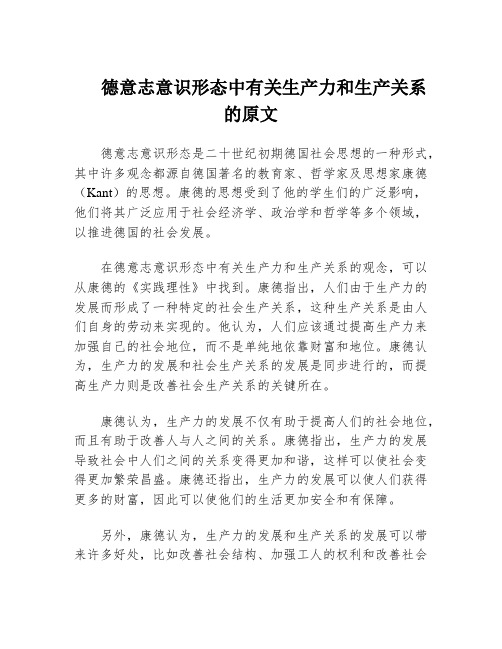
德意志意识形态中有关生产力和生产关系
的原文
德意志意识形态是二十世纪初期德国社会思想的一种形式,其中许多观念都源自德国著名的教育家、哲学家及思想家康德(Kant)的思想。
康德的思想受到了他的学生们的广泛影响,他们将其广泛应用于社会经济学、政治学和哲学等多个领域,以推进德国的社会发展。
在德意志意识形态中有关生产力和生产关系的观念,可以从康德的《实践理性》中找到。
康德指出,人们由于生产力的发展而形成了一种特定的社会生产关系,这种生产关系是由人们自身的劳动来实现的。
他认为,人们应该通过提高生产力来加强自己的社会地位,而不是单纯地依靠财富和地位。
康德认为,生产力的发展和社会生产关系的发展是同步进行的,而提高生产力则是改善社会生产关系的关键所在。
康德认为,生产力的发展不仅有助于提高人们的社会地位,而且有助于改善人与人之间的关系。
康德指出,生产力的发展导致社会中人们之间的关系变得更加和谐,这样可以使社会变得更加繁荣昌盛。
康德还指出,生产力的发展可以使人们获得更多的财富,因此可以使他们的生活更加安全和有保障。
另外,康德认为,生产力的发展和生产关系的发展可以带来许多好处,比如改善社会结构、加强工人的权利和改善社会
的经济状况等。
康德认为,只有通过改善生产力和生产关系,才能达到这些目标。
_存在_或_是_也谈Sein的翻译问题_从_省略_in论题和海德格尔对之所作的现

“存在”或“是”:也谈Sei n的翻译问题———从康德的Sein论题和海德格尔对之所作的现象学分析谈起舒远招/文提 要:在康德和海德格尔哲学中,Sein一词在一般的意义上被称为Seinüberhaup t,它既可以作逻辑的(logisch)运用,充当逻辑系词Kopula,也可以作康德所说的“绝对的断定”,即海德格尔所说的“存在上的”(on2tisch)运用,此时的Sein在断定一个对象的客观存在,因而与Existenz(实存)的含义相同。
Seinüberhaup t和作为逻辑系词Kopula的Sein都应该翻译为“是”,但作绝对断定或表示存在的Sein,翻译为“存在”或“实存”都是可以的。
关键词:存在;是;Sein;Existenz中图分类号:B516131 文献标识码:A与西方其他哲学一样,康德哲学在中国的传承,也常遇到术语的翻译难题。
Sein即为一例。
由于理解上的不同,大陆学者在翻译康德有关Sein论题时,出现了“存在”和“是”两种不同的译法。
本文试图就康德Sein论题中的Sein的中文翻译进行一些讨论,同时,想结合海德格尔对康德Sein论题所作出的分析,尤其是他在《现象学的基本问题》中对康德Sein论题所作的现象学分析,来考察海德格尔哲学中Sein一词的翻译问题。
一、大陆学界对康德Sein论题中Sein的翻译正如海德格尔在《现象学的基本问题》中指出的那样,康德并无专著来探讨Sein问题。
他只是在批判著名的上帝存在的ont ologisch证明时,才“顺带地”提出了自己的Sein命题。
在《纯粹理性批判》先验逻辑中的先验辩证论部分,即在辩・・39证论的第3章(Haup tst ück )“纯粹理性的理想”第4节(Abschnitt )中,康德明确谈到了Sein 。
该节标题是“Von der Unm glichkeit eines ontologischen Beweises vom Dasein Gottes ”,大陆学者一般译为“上帝存在的本体论证明的不可能性”。
康德的社会思想
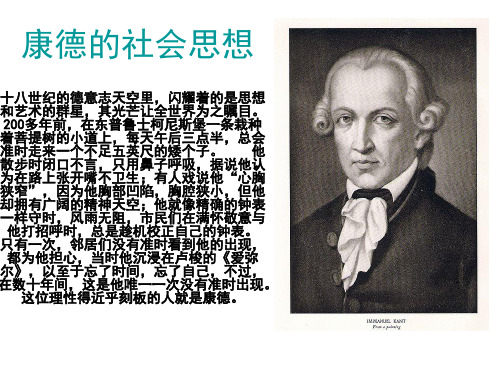
• 25.道德首先被要求的是支配自己 • 26.天才是自创法则的人。 • 27.道德确实不是指导人们如何使自己幸福的教条,而是指导人们如何配享有幸福的
• 康德的著述和讲课使他称为一个受人尊敬的哲学家,他的影响开始走出 科尼斯堡,很多学生慕名而来成为他的弟子,其中最著名的便是与哥德
和席勒一起成为魏玛古典派顶梁柱的赫尔德。尽管如此,康德很长的时
间里没有得到教授职位,期间他拒绝了科尼斯堡提供给他的诗学艺术教
授聘书。他还拒绝了来自埃尔朗根大学和耶拿大学的教授聘书,他只愿
授以后,康德沉寂十年没有发表一篇文章,而是潜心研究他的批判哲学。 1781年,他发表了“纯粹理性批判”,仅凭这一部著作,康德就可以奠 定他在哲学史上的不朽地位。在此期间康德作为教师和著作家,声望日
隆。除讲授物理学和数学外,还讲授逻辑学、形而上学、道德哲学、火 器和筑城学、自然地理等。1804年2月12日上午11时,伊曼努尔·康德在 家乡科尼斯堡去世。康德对费希特的科学哲学给予的评价是:一钱不值。
• 11.没有目标而生活,恰如没有罗盘而航行。 • 12.想要成就大事业,要在青春的时候着手。 • 13.活动或运动是人体健康的导师. • 14.人不能被判为奴,他只能自认为奴。 • 15.哲学无法教授,哲学永远是思想者的事业。 • 16.“我不是教给你们哲学,而是教你们如何进行哲学思考” • 17.当爱情需要我的时候,我没有资格去享用它,当我需要爱情的时候它却离我而去 • 18. 理性一手拿着自己的原理,一手拿来着根据那个原理研究出来和实验,奔赴自然。 • 19.我是孤独的,我是自由的,我就是自己的帝王。 • 20.生气,是拿别人的错误惩罚自己。 • 21.人就是现世上创造的最终目的,因为人乃是世上唯一无二的存在着能够形成目的
康德批判哲学体系中自然与自由的统一

康德批判哲学体系中自然与自由的统一康德是18世纪德国哲学家,他的著作《判断力批判》中提出了自然与自由的统一性的观点。
康德认为,自然和自由并不是相互排斥的,而是可以和谐统一的。
他的批判哲学体系中,自然和自由的统一成为了他的哲学核心之一,对后世哲学产生了深远影响。
康德认为自然和自由并不是对立的。
传统上,人们往往认为自然是由客观规律支配的,而自由则是人类意志的表现。
在此二者之间存在着矛盾和冲突,一方面自然的规律决定了人类的行为,另一方面自由的意志又似乎可以摆脱自然规律的约束。
康德提出了新的观点,他认为自然和自由可以和谐统一,而不是相互排斥的。
在康德看来,自然与自由之间存在着某种内在的联系,而不是简单的对立。
康德认为,自然和自由统一的关键在于人的认识活动。
他认为,人类的认识活动并非passively 接受外界的客观规律,而是主动地塑造和创造世界。
康德强调人类的认识活动是建构世界的活动,是自由的表现。
他也承认自然世界具有自身的规律和本原,这种本原对我们的认识活动具有指导和约束的作用。
康德认为,自然和自由并不是对立的,而是可以统一的。
在康德的批判哲学体系中,自然和自由的统一在他的伦理学和政治哲学中得到了深刻的展开。
康德认为,自然界是存在独立于我们的主观意识之外的客观实在,但我们的认识活动也是自由的表现。
人的自由意志使其成为价值判断的主体,人类的价值判断并不是从自然规律中推导出来的,而是由我们的自由意志建构的。
康德强调自由意志是道德行为的基础,而道德则是人类社会生活的基石。
在政治哲学领域,康德也强调了自然和自由的统一。
他认为,政治秩序并非应当建立在对自然的服从之上,而是应当建立在人类的自由意志之上。
康德主张建立一个基于法治、自由和自治的国家,这种国家既要尊重每个人的自由意志,又要保障社会的秩序和稳定。
这种法治国家既要保障人民的自由平等,又要约束人们的自由行为,使得每个人都可以在自由的秩序中发展自己的才能和品德。
关于康德《纯粹理性批判》的汉译

关于康德《纯粹理性批判》的汉译黎业明人们对于康德著作的汉译是十分关心的。
对于康德《纯粹理性批判》的翻译尤为关心。
2000年的《读书》杂志就发表了好几篇谈论《纯粹理性批判》汉译的短文。
从这几篇短文以及其他一些讨论康德的文章可以看出,许多人(包括有些研究西方哲学的专家)对康德著作的汉译情况并不十分了解。
现冒昧将我们所了解的康德《纯粹理性批判》的汉译情况略为介绍。
据我们所知,康德《纯粹理性批判》现有四种汉译本:(1)胡仁源先生译本,上海商务印书馆1931年出版;(2)蓝公武先生译本,北京三联书店1957年出版,1960年以后改由商务印书馆出版;(3)牟宗三先生译本,题为《康德纯粹理性之批判》,分为上、下两册,台北学生书局1983年出版;(4)韦卓民先生译本,武汉华中师范大学出版社1991年初版,2000年校订版。
对于这些译本的质量,人们时有评论,现摘要介绍如下:在现有四种汉译中,以胡仁源先生的译本为最早。
韦卓民先生说:“胡氏中译本,读来确甚晦涩,其原因大概是胡先生从德文原本译出,而对于康德的哲学术语似乎没有深加留意,且对于康德的整个体系又好像未深入研究,况且译文较旧,不合现代汉语习惯。
”(韦卓民撰:《〈纯粹理性批判〉中译者前言》,见所译《纯粹理性批判》卷首。
顺便说一句,王若水先生认为胡译本并非从德文原本译出,而是根据F.Max Müller1896年的英译本转译。
见王若水撰:《再说〈纯粹理性批判〉的中译本》,《读书》,2000年第6期。
)王太庆先生也谈到,抗日战争后期在西南联大哲学系读书时,他读胡译本的感受。
他说:“在翠湖中间的那所省立图书馆里,我一连几天借阅胡仁源译的《纯粹理性批判》,可是尽管已经有教科书上的知识做基础,我还是一点没有看懂。
不懂的情况和读斯宾诺莎《伦理学》的旧译本差不多,一看就不懂,而且越看越不懂。
后来看了Kemp Smith的英译本和Barni的法译本,才发现康德的写法尽管有些晦涩,却并不是那样绝对不能懂的。
- 1、下载文档前请自行甄别文档内容的完整性,平台不提供额外的编辑、内容补充、找答案等附加服务。
- 2、"仅部分预览"的文档,不可在线预览部分如存在完整性等问题,可反馈申请退款(可完整预览的文档不适用该条件!)。
- 3、如文档侵犯您的权益,请联系客服反馈,我们会尽快为您处理(人工客服工作时间:9:00-18:30)。
3. Social ContractKant provides two distinct discussions of social contract. One concerns property and will be treated in more detail in section 5 below. The second discussion of social contract comes in the essay “Theory and Practice” in the context of an a priori restriction on the legitimate policies the sovereign may pursue. The sovereign must recognize the “original contract” as an idea of reason that forces the sovereign to “give his laws in such a way that they could have arisen from the united will of a whole people and to regard each subject, insofar as he wants to be a citizen, as if he has joined in voting for such a will” (8:297). This original contract, Kant stresses, is only an idea of reason and not a historical event. Any rights and duties stemming from an original contract do so not because of any particular historical provenance, but because of the rightful relations embodied in the original contract. No empirical act, as a historical act would be, could be the foundation of any rightful duties or rights. The idea of an original contract limits the sovereign as legislator. No law may be promulgated that “a whole people could not possibly give its consent to” (8:297). The consent at issue, however, is also not an empirical consent based upon any actual act. The set of actual particular desires of citizens is not the basis of determining whether they could possibly consent to a law. Rather, the kind of possibility at issue is one of rational possible unanimity based upon fair distributions of burdens and rights in abstraction from empirical facts or desires. Kant's two examples both exemplify this consideration of possible rational unanimity. His first example is a law that would provide hereditary privileges to members of a certain class of subjects. This law would be unjust because it would be irrational for those who would not be membersof this class to agree to accept fewer privileges than members of the class. One might say that no possible empirical information could cause all individuals to agree to this law. Kant's second example concerns a war tax. If the tax is administered fairly, it would not be unjust. Kant adds that even if the actual citizens opposed the war, the war tax would be just because it is possible that the war is being waged for legitimate reasons that the state but not the citizens know about. Here possible empirical information might cause all citizens to approve the law. In both these examples, the conception of “possible consent” abstracts from actual desires individual citizens have. The possible consent is not based upon a hypothetical vote given actual preferences but is based on a rational conception of agreement given any possible empirical information.Kant's view is similar to the social contract theory of Hobbes in a few important respects. The social contract is not a historical document and does not involve a historical act. In fact it can be dangerous to the stability of the state to even search history for such empirical justification of state power (6:318). The current state must be understood, regardless of its origin, to embody the social contact. The social contract is a rational justification for state power, not a result of actual deal-making among individuals or between them and a government. Another link to Hobbes is that the social contract is not voluntary. Individuals may be forced into the civil conditionagainst their consent (6:256). Social contract is not based on any actual consent such as a voluntary choice to form a civil society along with others. Since the social contract reflects reason, each human being as a rational being already contains the basis for rational agreement to the state. Are individuals then coerced to recognize their subjection to state power against their will? Since Kant defines “will” as “practical reason itself” (Groundwork, 4:412), the answer for him is “no.” If one defines “will” as arbitrary choice, then the answer is “yes.” This is the same dichotomy that arises with regard to Kant's theory of punishment (section 7). A substantial difference between Kant and Hobbes is that Hobbes bases his argument on the individual benefit for each party to the contract, whereas Kant bases his argument on Right itself, understood as freedom for all persons in general, not just for the individual benefit that the parties to the contract obtain in their own particular freedom. To this extent Kant is influenced more by Rousseau's idea of the General Will.10. Social Philosophy“Social philosophy,” can be taken to mean the relationship o f persons to institutions, and to each other via these institutions, that are not part of the state. Family is a clear example of a social institution that transcends the individual but has at least some elements that are not controlled by the state. Other examples would be economic institutions such as businesses and markets, religious institutions, social clubs and private associations created to advance interests or for mere enjoyment, educational and university institutions, social systems and classifications such as race and gender, and endemic social problems like poverty. It is worth noting a few particulars, if only as examples of the range of this topic. Kant advocated the duty of citizens to support those in society who could not support themselves, and even gave the state the power to arrange for this help (6:326). He offered a biological explanation of race in several essays and also, certainly into his “Critical” period, held that other races were inferior to Europeans. He supported a reform movement in education based on the principles presented by Rousseau in “Emile”. I will not provide detailed treatement of Kant's views on these particular matters (some of which are scant) but only focus on the nature of social philosophy for Kant.Kant had no comprehensive social philosophy. One might be tempted to claim that, in line with natural law theorists, Kant discusses natural rights related to some social institutions. One might read the first half of the “Doctrine of Right” as a socialphi losophy, since this half on “Private Right” discusses the rights of individuals relative to one another, in contrast to the second half on “Public Right” that discusses the rights of individuals relative to the state. Kant even offers an explanation of this difference by claiming that the opposite of state of nature is not a social but the civil condition, that is, a state (6:306). The state of nature can include voluntary societies (Kant mentions domestic relations in general) where there is no a priori obligation for individuals to enter them. This claim of Kant's, however, is subject to some doubt, since he explicitly links all forms of property to the obligation to enter the civil condition (see section 5 above), and his discussion of marriage and family comes in the form of property relations akin to contract relations. It is thus not obvious how there can be any social institutions that can exist outside the civil condition, to the extent that social institutions presuppose property relations.Another approach to the issue of social philosophy in Kant is to view it in terms of moral philosophy properly speaking, that is, the obligations human beings have to act under the proper maxims, as discussed in the “Doctrine of Virtue” (see section 1 above). In t he “Doctrine of Virtue” Kant talks about the obligation to develop friendships and to participate in social intercourse (6:469–74). In the Religion within the Boundaries of Mere Reason Kant discusses the development of an “ethical commonwealth” in which hu man beings strengthen one another's moral resolve through their participation in the moral community of a church. He also holds that educational institutions, the subject of his book On Pedagogy, should be designed toprovide for the development of morality in human beings, who lack a natural disposition for the moral good. In these cases Kant's social philosophy is treated as an arm of his theory of virtue, not as a freestanding topic in its own right.A third approach to social philosophy comes through Kant's Anthropology from a Pragmatic Point of View. Kant had envisioned anthropology as an empirical application of ethics, akin to empirical psychology as a application of pure metaphysical principles of nature. Knowledge of the general characteristics of human being as well as particular characteristics of genders, races, nationalities, etc, can aid in determining one's precise duties toward particular individuals. Further, this knowledge can aid moral agents in their own task of motivating themselves to morality. These promises of anthropology in its practical application are unfulfilled, however, in the details of Kant's text. He does little critical assessment of social prejudices or practices to screen out stereotypes detrimental to moral development. His own personal views, considered sexist and racist universally today and even outof step with some of his more progressive colleagues, pervade his direct discussionsof these social institutions.10.社会哲学“社会哲学”,可以用来表示人对机构的关系,彼此通过这些机构,不属于国家的一部分。
